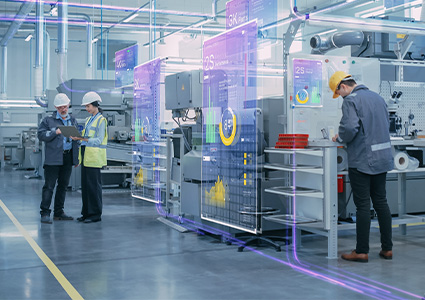How AI is transforming manufacturing: bridging innovation with practicality.
The rise of Artificial Intelligence (AI) is reshaping industries, processes and job descriptions worldwide, and manufacturing is no exception.
From predictive maintenance to personalized product designs, AI-assisted applications offer increased efficiency, reduced costs and enhanced productivity. Navigating the adoption of AI apps in manufacturing requires a practical, strategic approach to ensure it delivers tangible results.

The key to success lies in deploying AI where it will make the most significant impact. Different manufacturers have very specific processes and the realities of their operations make some processes more amenable to AI than others – such as machine performed tasks, and employee online systems. This focus on pragmatic innovation, rather than blind adoption, means AI adoption in manufacturing must be approached as an evolution rather than an overwhelming challenge such as swapping out an ERP system.
Addressing modern manufacturing complexity
Modern manufacturing is a maze of global supply chains, advanced machinery, and diverse production lines, each generating massive amounts of data. This ‘data deluge’ holds the promise of operational transformation – if harnessed effectively.
AI shines in managing complexity. Machine learning algorithms can analyze vast datasets from sensors, machines, and workflows to uncover inefficiencies and recommend optimizations. Predictive analytics enables manufacturers to anticipate equipment failures, reducing costly downtime. Such capabilities are vital in a market where thin margins leave little room for error and disruptions can ripple across entire supply chains.
AI-powered automation: beyond traditional approaches
Automation has long been a cornerstone of manufacturing, but traditional manufacturing systems, reliant on rigid pre-programmed routines, struggle to adapt to rapid changes in demand, materials, or production requirements. AI-driven automation introduces a level of flexibility and adaptability previously unavailable.
For instance, AI-powered robots equipped with computer vision can inspect products with greater speed and accuracy than human workers. These systems continuously improve, learning from past data to deliver consistent quality. In supply chains, AI-powered systems dynamically adjust inventory levels, forecast disruptions, and optimize logistics, enabling manufacturers to respond swiftly to market fluctuations.
This intelligent automation doesn’t just enhance efficiency; it also allows manufacturers to reimagine workflows. With AI, repetitive tasks are handled autonomously, freeing employees to focus on design, process innovation and problem-solving.
Scaling AI thoughtfully
While the benefits of AI are clear, its adoption must be carefully scaled to avoid overwhelming existing systems and employees or creating unnecessary disruption to production lines or supply chains. High implementation costs, a lack of expertise, and integration challenges remain barriers for many manufacturers.
The solution lies in a phased approach to AI adoption, starting with targeted use cases that address immediate pain points. For example, a manufacturer might begin with predictive maintenance, using AI to extend the lifespan of equipment and reduce operational disruptions. Once this capability is proven, AI can be expanded to more complex areas, such as supply chain optimization or product customization.
This gradual integration allows manufacturers and their suppliers to build expertise, measure ROI, and align AI capabilities with strategic objectives. It also helps alleviate workforce concerns by demonstrating that AI is a tool for empowerment, enhancing roles rather than replacing them. 
Mass customization at scale
As consumer preferences grow increasingly diverse, manufacturers are under pressure to deliver personalized products without sacrificing efficiency. AI is making mass customization a reality by seamlessly integrating personalization into production workflows.
By analyzing customer data, AI can identify demand for specific features or designs, guiding production teams to create tailored products with minimal additional effort. This capability is especially impactful in industries like automotive and electronics, where personalization is becoming a competitive differentiator.
AI ensures that customization doesn’t come at the expense of efficiency, maintaining the cost advantages of mass production while meeting unique customer needs.
The potential in manufacturing is vast, but AI’s success hinges on thoughtful, strategic adoption. By focusing on practical applications, scaling use cases gradually, and integrating AI into existing workflows, manufacturers can harness its transformative power while avoiding unnecessary complexity.
AI is not a one-size-fits-all solution, but when adopted with care, it has the potential to redefine manufacturing. From enhancing quality and driving efficiency to advancing sustainability and enabling customization, the future is going to be different with AI.
By Manoj Chaudhary
Manoj Chaudhary is CTO at Jitterbit. Jitterbit empowers business transformation with low-code enterprise solutions for integration and application development. Jitterbit combines and simplifies the power of iPaaS, APIM, EDI, and LCAP to amplify the value of on-premise, cloud-based, and SaaS systems and accelerate the digital journey. Organizations around the globe rely on Jitterbit’s experience and expertise to help them automate critical business processes and build applications to future proof their business.
